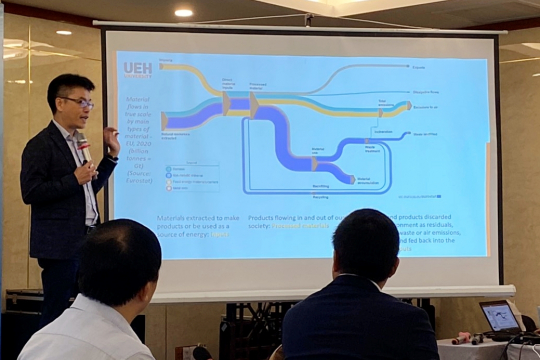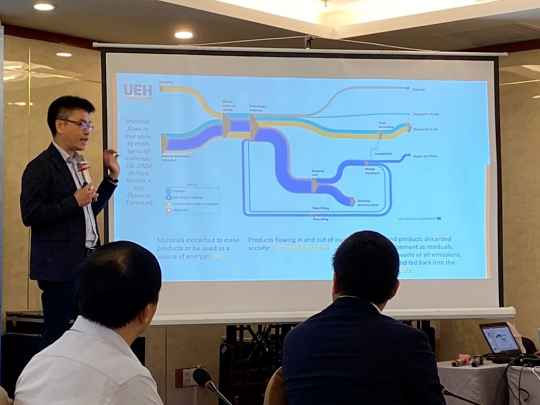The Institute of Strategy and Policy on Natural Resources and Environment (ISPONRE) Vietnam organized a consultation workshop on the first draft of Vietnam's National Action Plan for Circular Economy (NAPCE) implementation. The workshop, which took place on June 22nd, aimed to collect comments from relevant organizations and individuals in order to complete the draft plan, which will be submitted to the Prime Minister for promulgation by November 2023.
The NAPCE is a key task assigned to the Ministry of Natural Resources and Environment (MONRE) and outlines the main solutions to implement the socio-economic development plan, state budget estimate, business environment improvement, and enhance national competitiveness. The NAPCE is also aligned with the Paris Agreement on Climate Change, which Vietnam has ratified and committed to implementing.
Broad participation in the meeting
The workshop was attended by representatives from MONRE and other ministries, provincial People's Committees, development partners, UN agencies, NGOs, businesses, research institutes, press and media agencies, various organizations and experts.
Dr. Pham Khanh Nam, Center Director of EfD Vietnam, participated and shared the center’s insights on material flows in a circular economy and the scientific basis for proposed priority sectors in NAPCE. In his presentation, Pham Khanh Nam addressed two key questions: (1) What are the circularity rate and material flows in Vietnam? (2) How is it distributed across different economic sectors?
Lack of data is problematic
He showed that the estimated circularity rate of Vietnam (without exported and imported waste) varies from 4.0 to 4.9% in 2016-2022.
“That is a great effort for developing countries like Vietnam, although it is quite low compared to European countries,” Pham Khanh Nam said.
He also pointed out the challenges of data availability and quality for calculating the circularity rate and material flows in various sectors such as housing, mobility, consumables, and services. The report from EfD Vietnam also highlighted the lack of domestic waste generation data by waste type, the lack of data on non-hazardous waste treatment and recycling, and the difficulty of determining whether waste import/export is for recycling or other purposes
“It’s an economic opportunity”
Pham Khanh Nam suggested that improving data collection and management systems is essential for developing and implementing effective policies and strategies for circular economy in Vietnam. He also recommended that priority sectors for NAPCE should be based on criteria such as material intensity, environmental impact, economic value, and social benefit.
“Circular economy is not only an environmental solution but also an economic opportunity for Vietnam. By applying circular economy principles, we can reduce waste generation, save resources, create jobs, and enhance innovation,” Pham Khanh Nam said.
The workshop was a fruitful platform for exchanging views and feedback on the draft NAPCE among stakeholders. It also contributed to raising awareness and understanding of circular economy concepts and practices among policymakers, businesses, and society.
Will include input in final draft
“We appreciate the efforts and contributions of experts in developing the draft NAPCE. We hope that the final NAPCE will reflect the inputs from all relevant parties and provide a clear roadmap for Vietnam to achieve its circular economy goals,” said Dr. Mai Thanh Dung, the Deputy Director of ISPONRE.
The ISPONRE will incorporate the comments and suggestions from the workshop into the final draft of NAPCE before submitting it to MONRE and the Prime Minister for approval.

